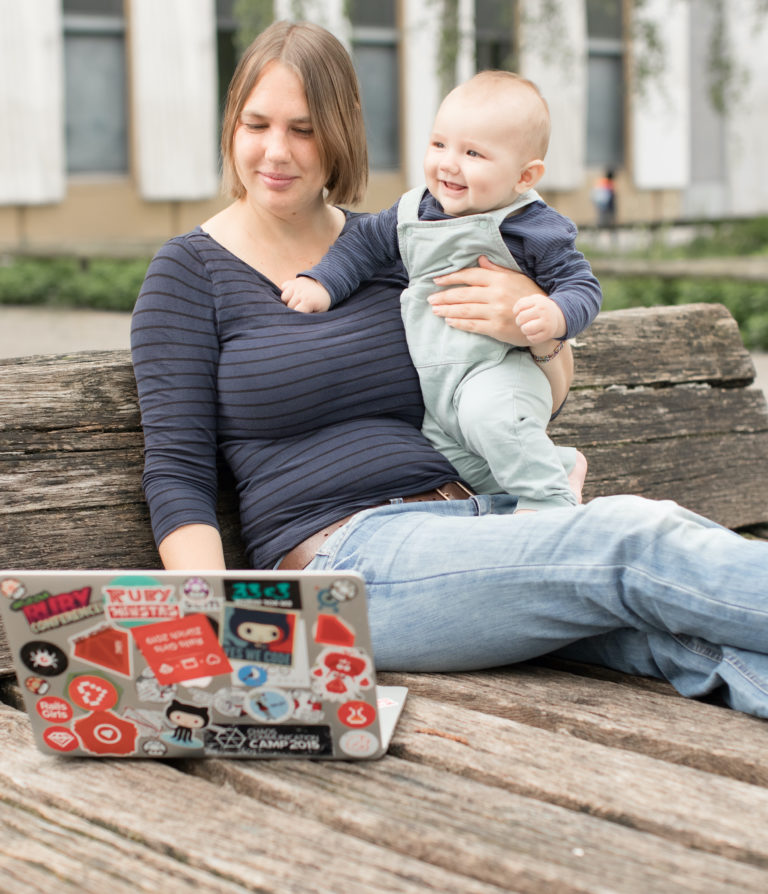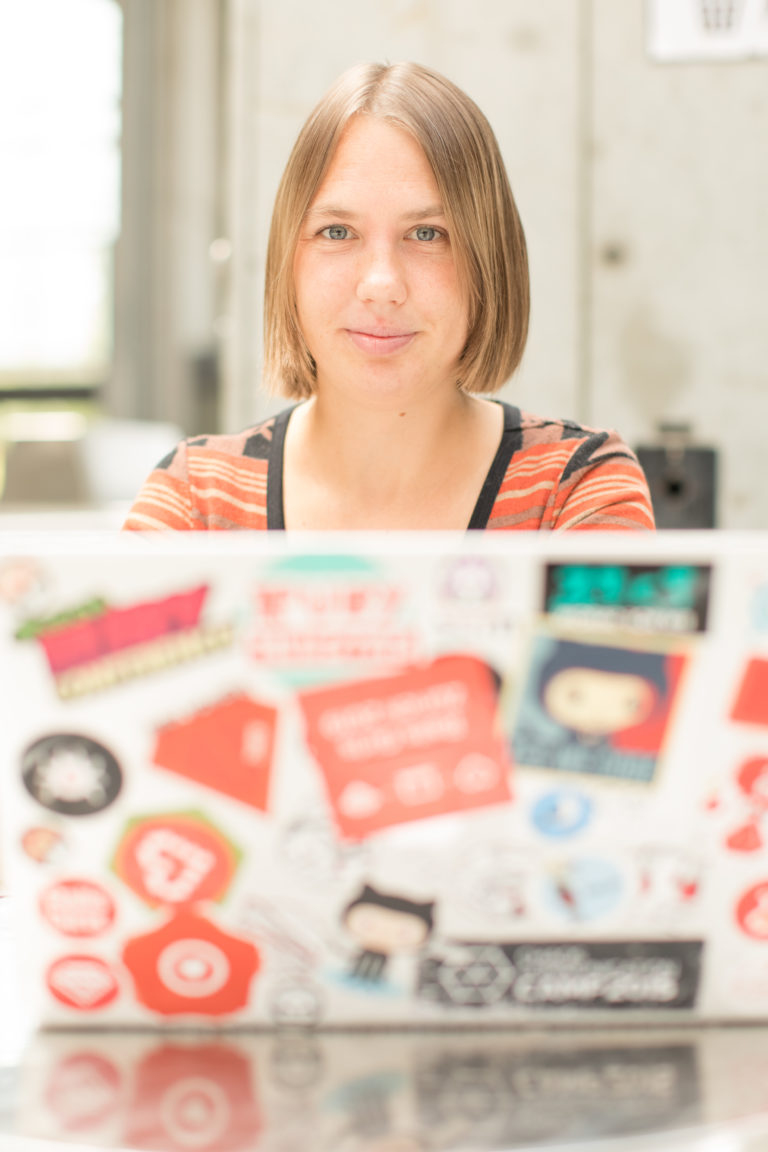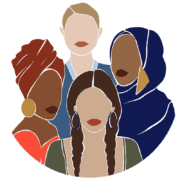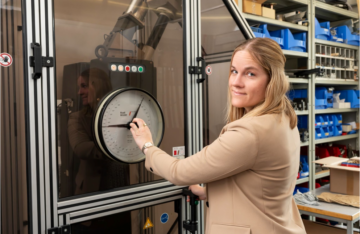Each month we have the honor of interviewing Women Who Inspire Us. This month we talked to Hana Harencarova who is the Founder of Moms Learn to Code and works as a Software Engineer at GitHub. As a career changer, Hana has found her passion as a Ruby on Rails developer through coding courses and a supportive community. Learn about Hana’s inspiring career path and how she wants to create more awareness for the needs of working parents in the tech industry.
Tell us about where you’re from – geography, studies or professional background, industry, and how you made it to your current role.
I am originally from Slovakia and have lived in Zürich for the last 10 years. I studied psychology and did a PhD in judgment & decision making. During that time, I had to learn R, a statistical programming language, and I discovered that it was more fun for me to learn programming than analyzing the data.
After my PhD, I moved to Zürich because of my partner where we’ve been running a paragliding school together for a few years, teaching our students how to fly. I was also doing the website for the school using WordPress. Before my daughter was born, I always thought that once she is 3 months old, I would be able to just take her with me everywhere and continue my life as a paragliding teacher as it was. But it did not turn out quite like that.
After a while, I wanted to do something else, a job that is more flexible and that I can do from home being with my daughter. I naturally turned back to coding, and website development. I learned some more web development, did some freelance website projects for small business owners, and joined the Ruby Monstas meetups in Zürich.
Ruby Monstas is a free coding course for women where I learned Ruby. I stuck to that course and visited every week for 2 years. During that time, I also learned Ruby on Rails which is a full-stack web app framework, and started to coach there afterwards.
In the meantime, I started to miss interacting more with people. That’s why I launched the web development courses for moms called Moms Learn to Code, where parents were able to bring their babies and kids to the course. The idea was born when I was looking for a course for me while having my baby around. I found many courses for children and even babies, but not something for myself where I could bring my child. So I decided to fill this gap and founded Moms Learn to Code. About 30-50% of the women brought their kids with them.
Later, I wanted to do more Ruby and Rails as a freelancer and was offered a contractor role for a bigger company where I was happy to work as a Rails developer for a year. Afterwards, I was looking for a new opportunity. That’s when I saw an open position for GitHub, which was advertised in Switzerland but was actually a remote position. I applied and ended up working at GitHub in the Code Scanning team.
I really feel like I found the perfect place for me right now. At GitHub, I work on really interesting products and challenges, I’m fortunate to work with a great team and also I have the flexibility that I need as a parent.
What do you like about the tech industry?
I really like the constant flow of new challenges. There is always something new, a new update, new tools, a new way to learn how to write software better. It’s also super interesting that you can bring your ideas to life. A big part of our lives are digital, and it is important to understand how things work. It makes you feel more empowered.
It’s also great to be able to create your own products and help people with technology. At GitHub, we are working on things that millions of people use, so doing a good job makes their lifes better. It’s a place where one can have a big impact.

I found many courses for children and even babies, but not something for myself where I could bring my child. So I decided to fill this gap and founded Moms Learn to Code.
What motivates you at work? Why do you get up for work?
I mostly focus on my work at GitHub now, and what motivates me there is learning new things and working with great people from which I can learn a lot. We are now working on enabling the code scanning with a couple of clicks, making it easier for people to manage vulnerabilities in multiple repositories. And we see the adoption of code scanning going up after we rolled out this feature. We see the impact of the work we are doing. It’s challenging, but interestingly challenging. This is what keeps my motivation up.
For Moms Learn to Code, or coaching at Ruby Monstas, I love seeing how people, especially women, learn a lot if they believe in themselves. Also, I can’t repeat enough that it’s ok to feel overwhelmed at the beginning, and to have many questions. I felt exactly the same, and I still sometimes feel like this today.
I also currently mentor someone from the program and she starts to see that everything is learnable, but that it needs time. It’s amazing if you can look back at what you did in the past, and see what you’ve already learned. Whenever you feel it’s going slowly, have a look at what you can do now, and compare it to what you did a few years ago. For me it’s a huge difference, and it helps me to see the progress over time.
Did you ever find yourself in an unfair position? Why? How did you overcome it?
To be honest, I don’t think I have ever found myself in a strongly unfair position. I am not in tech for that long and I was pretty lucky so far with the companies I worked at.
What I would recommend in how to overcome situations when you are not treated fairly, is to first bring it to the attention of those involved. Many people don’t realize that you are being treated unfairly because it’s not happening to them. Let them know in a nice way to first see if there is a willingness to change. If you find that you cannot change things, find another place where you are treated better. There are many great places to work at in tech. Never feel like you have to stay in a position or at a company that does not work for you.
How do you juggle work and parenting at the same time?
What helped me a lot was working part-time at the beginning, being able to do freelancing, and having a lot of flexibility. Me and my husband always shared a lot of the child care and until recently we were both self-employed. So we found time for the family and for work too.
It was also great to be able to sleep in after a rough night. Flexibility helps a lot when coupling the roles of developer and being a mom of young kids. Now when my daugher goes to kindergarten it’s way harder to get some long morning.

I truly believe that you don’t have to feel ready to make the next step.
Is there anything you wish you had known earlier or would advise your younger self?
I am generally very happy how things went and what I did. It always made sense at the time and also where I ended up in my life. If I changed anything I would miss that part of my life, the lessons learned and the experiences.
Not being afraid to do the next step, and go out your comfort zone. In general, I truly believe that you don’t have to feel ready to make the next step. You’ll rarely feel ready to apply for a job, to apply for a conference talk, or to run your own courses even though you are. So just go for it. It will bring many valuable experiences, and it will push you so much forward.
When you are confronted with a new problem, know that you can deal with it and that it’s an opportunity to learn something new. Get comfortable with things you don’t know. Focus on problem solving and learning skills. Doing only the things you already know gets boring very quickly.
If you weren’t doing what you do today, what would you be doing and why?
One recurring topic in my life was always teaching. I found myself teaching people whenever I did something. I started at the age of 15 when I was teaching younger kids to develop photographs in a darkroom and organized photoshooting trips with them. During my PhD a large part of my work was teaching psychology classes. Afterwards, I was teaching paragliding, teaching to code, coaching, etc.
So, I think it would most probably be something with people and teaching. I also love to travel and being outside. It’s kind of the antithesis to the software development, but my work naturally motivates me to go outside to nature.
Teaching brings you so much learning for yourself as well. Once you need to explain it to someone, you find out what you really know and what you just think you know. When people come and ask you questions, you find all the gaps you need to fill in. It can also be by writing blogs or technical documentation where you get that direct feedback about what you know and what you don’t know.
What was your first experience with technology?
I still have my first computer which was called “Palino” that I got from my dad. I don’t use it anymore because it’s very old, but it’s still around. It reminds me that I was probably so keen on learning about technology thanks to my dad. I could play in his office the first computer games.
This experience as a child also helped me a lot to feel at ease with technology. I even learned HTML, CSS and Pascal as a kid. I have grown up with technology and it feels very much like home to me.
It is however a topic I struggle with my own kids now. I also want to give them this experience, so that they know all the digital tools early on, but at the same time I want to limit their exposure to technology and I tend to postpone it. It’s about finding a balance.
I have not made my mind up yet about the use of technology by my children. There are cool apps and learning programs for children, but I also want them to do something else than watching videos and playing with apps all day long. My daughter actually got a tablet for her birthday and I still need to set it up. She keeps asking about it, but I didn’t managed to get to it yet.

More awareness is needed to accomodate the needs of working parents.
Are there any readings, podcasts or other resources that you enjoy or recommend?
For people that want to get into technology or are new to coding I would recommend two podcasts:
- CodeNewbie, a podcast for anyone new to coding, but also generally very welcoming and easy to listen to.
- Ruby for All by Julie & Andrew, a podcast that aims to make the Ruby programming language accessible to everyone.
Ruby Monstas is a coding meetup and a free coding course that happens in-person in Zürich, and there also online sessions, every Monday at 18:30. You can meet me there.
Wizard Zines from Julia Evans, a little cartoon books that explain different tech topics in a simple and fun way.
The Culture Map from Erin Meyer, a book where she explores how people from different countries and cultures interact with each other in a work context and which challenges arise from their differences. At the beginning I found the content a bit too obvious, but after the first two chapters I got drawn in and learned about some topics that were very interesting and that I had never thought about before. It also helped me with working in an international company where you cooperate with people from different countries, especially to understand why people behave in certain ways.
First Ruby Friend is a mentorship and coaching program by Andy Croll and, you can apply as a mentor or mentee, get mentorship or help people that are new in the industry.
Anything else you’d like to share with our community?
There is something I still do which I want to stop doing. I have this tendency to not talk about my kids at work and also never talk about the challenges and struggles with them. I believe it’s because I want to show that I can handle it well. But this way I am reinforcing this pattern in our society that kids are not supposed to be visible and so I try to be more conscious about it and more clear about it.
Our culture is not very welcoming to kids. We don’t get exposed to children that much, e.g. people don’t bring their kids to restaurants super often here in Switzerland nor in Slovakia. I really enjoy that it’s much more normal in Italy for example, people even enjoy the company of children in a restaurant.
I can imagine that it is sometimes more difficult for parents to work in teams with no or very few other parents as the meetings and team building activities often take place too late or during the family time. More awareness is needed to accomodate the needs of working parents.
Also in this regard our team is great. GitHub being a remote first company is really doing great in async communication. We’re flexible by default. Also, many of my team members are parents too and it’s common and okay if kids (or cats for that matter) pop up in the calls sometimes.
I also really appreciate people that talk openly about the struggles they have with their children, also at work, for example when you weren’t able to sleep. Or people that make it clear that there are blocked times for the family where they make rarely compromises. It’s about raising awareness and normalizing the fact that we have families and children.
This openness also makes it easier for people without kids, so they can block time for exercising or other freetime activities. Picking kids up in the evening is a natural stop for me with the work and it creates healthy boundaries.
The other thing I wanted to share is about career changers in tech. I am a career changer and what also really helped me during the job interviews was to be aware of all the things that I’m bringing to the table.
Just because you’re new in tech it does not mean you don’t have anything to bring in from your previous experience. As a career changer you bring for example the knowledge from another field that no one else in the team can bring. You can be a bridge to customers, you can develop better products for them because you understand their problems better.
And then there are all the transferable skills like teamwork and communication skills. Software development is not a solitude job, there is a lot of communication going on, and you have to make it work with others in the team. If you have a person that is genius in coding, but cannot communicate or it’s hard to work with, that’s not going to help the team succeed. Think about all the transferable skills from your previous jobs, from volunteering, and the field knowledge you are bringing in. It’s often much more than you think that you can offer.
Hana, your story, your passion for teaching and helping others, and your drive to becoming a better version of yourself every day have truly impressed us. Thank you for being a woman who inspires us! 💛
Author: Lisa Stähli






